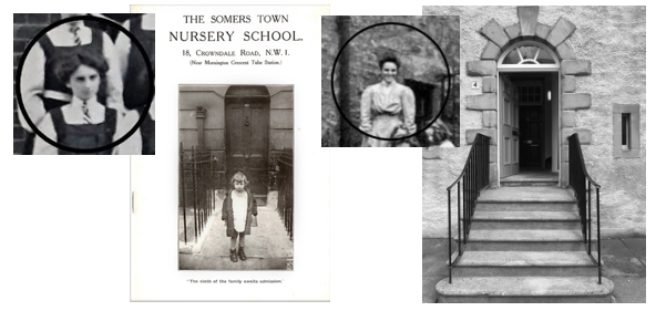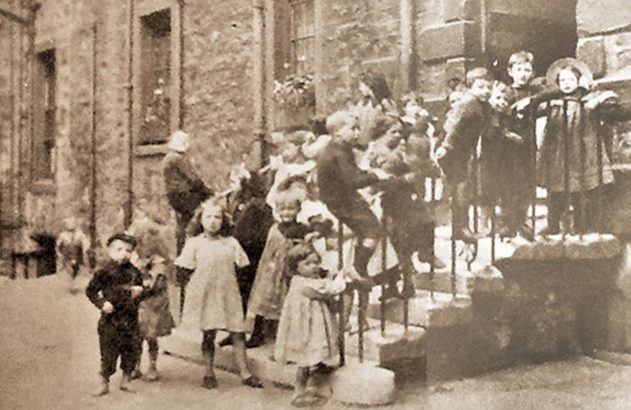On International Women’s Day Dr Jane Read and Jane Whinnett explore the work of two Froebelian women educators in the early 20th century. Recording now available.
A recording of this event is now available in our webinar library.
Froebel pioneered the role of women as educators of young children. Since his death 170 years ago, many women have adopted his pioneering spirit. On International Women’s Day Dr Jane Read and Jane Whinnett explore the work of two Froebelian women educators who chose to focus on supporting poor families in the early 20th century:
Kathleen Stokes at the Somers Town Nursery School, London and Lileen Hardy at the St Saviour’s Child Garden in Edinburgh’s Canongate.

This was a period full of challenges, particularly for working-class families living in the slums of Britain’s cities. Unemployment or sporadic employment meant that families could not be sure of a regular income to pay for rent, food or healthcare.
Although there were some support services, there was no NHS or comprehensive National Insurance system. Initially at least there were no mother and baby clinics. Children’s play spaces were the streets and gutters. State infant schools still imposed harsh disciplinary regimes even on the youngest children.
Using archive resources, the webinar presenters discuss how Stokes and Hardy perceived the needs of poor families in their communities and responded to them at a time when those very families were frequently blamed for their poverty and its consequences.
One hundred years later, poverty continues to shape the life chances of young children. Poverty rates are 36% in families with a child under five, and 52% among families with three or more children (Nuffield Foundation, 2021).
Today, ethnicity plays a key role in children’s experiences, with poverty levels at 50% in households headed by someone of Bangladeshi ethnicity or Pakistani ethnicity (Joseph Rowntree Foundation, 2021) and 53% for all black children, which is more than twice the rate for white children (Nursery World, 2022).
For UK families today, being in work is not a guaranteed route out of poverty: single working parent households’ poverty rates increased from 10% in 2010 to 20% in 2020 (IPPR, 2021).
What can we learn from the approaches used by Stokes and Hardy?
What are the roles and responsibilities of Froebelian educators in today’s unequal society?
Tuesday 8 March 2022
7pm - online via Zoom
Book your free ticket
About the speakers
Dr Jane Read
Dr Jane Read is Emeritus Fellow at the University of Roehampton, a member of the Froebel Trust’s Education Subcommittee and Editor of the Froebel Trust pamphlet series. Before moving into lecturing Jane was archivist of the Froebel Archive for Childhood Studies, based at Roehampton, and of the former National Froebel Foundation. Jane taught on Roehampton's Under- and Post- Graduate Early Childhood Studies courses and on the Froebel Professional Certificate in Early Childhood; she continues to teach on the Froebel in Childhood Practice course at the University of Edinburgh. Jane’s research and publications focus on the dissemination of Froebelian pedagogy across time and space and in diverse educational settings. Her most recent book, British Froebelian Women from the Mid-Nineteenth to the Twenty-First Century. A Community of Progressive Educators, is a co-edited collection of studies of Froebelian women educators illuminating themes of revision, dissemination and identity.
Those attending this event are able to get a 20% discount on any purchases of British Froebelian Women from the Mid-Nineteenth to the Twenty-First Century, edited By Amy Palmer and Jane Read by using the code FLA22 on the Routledge website. RRP £120.00
Jane Whinnett
Jane Whinnett is a Trustee of the Froebel Trust. She is former head teacher of two maintained nursery schools in Edinburgh, Scotland and a founder member of the Edinburgh Froebel Network. As a tutor for the University of Edinburgh, she tutors on both the Froebel Continuing Professional Development (CPD) course and the MSc Education – Early Childhood Practice and Froebel. She was awarded an MBE for services to Early Education in 2019. She has published articles, a Froebel Trust pamphlet Froebel’s Gifts and Block Play today (2020), contributed a chapter to the award-winning book Early Childhood Practice: Froebel Today (2012) and co-edited the highly successful Putting Storytelling at the Heart of Early Childhood Practice (2020).
About International Women's Day
International Women’s Day is a global day celebrating the social, economic, cultural, and political achievements of women. The day also marks a call to action for accelerating women's equality. IWD has occurred for well over a century, with the first IWD gathering in 1911 supported by over a million people. Today, IWD belongs to all groups collectively everywhere. IWD is not country, group or organisation specific. #IWD2022 #BreakTheBias


